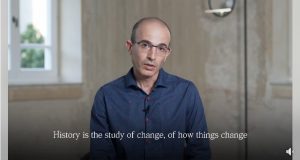- NYT’s Michelle Goldberg on the legacy of Rupert Murdoch;
- Responses to conservative dismissals of climate change (with some quotes by Carl Sagan);
- Veritasium: How knot theory could save your life;
- Yuval Noah Harari on how history is the study of change (a counterpart of science fiction perhaps).
One more good piece about Rupert Murdoch and his legacy.

NY Times, Opinion by Michelle Goldberg, 21 Sep 2023: The Ludicrous Agony of Rupert Murdoch
Goldberg is reacting in part to a new book by Michael Wolff, The Fall: The End of Fox News and the Murdoch Dynasty, to be published next Tuesday. The choice bits:
Few people bear more responsibility for Trump than Murdoch. Fox News gave Trump a regular platform for his racist lies about Barack Obama’s birthplace. It immersed its audience in a febrile fantasy world in which all mainstream sources of information are suspect, a precondition for Trump’s rise. (Many people have described losing loved ones to Fox’s all-consuming alternative reality.) After Trump lost in 2020, Fox helped spread the defeated president’s falsehoods about a stolen election, which both contributed to the Jan. 6 insurrection and cost Fox nearly $800 million in its settlement with Dominion Voting Systems. (It was as part of that settlement, Wolff writes, that Fox fired its biggest star, the demagogic troll Tucker Carlson. Fox and Dominion deny that Carlson’s firing was a condition of the settlement.)
And — note the idea of projection:
In Wolff’s telling, Murdoch is a sort of hapless Frankenstein, abominating the monster he set loose on the world but unsure how to fight him. This waffling, however, is a product of the same venality that has always undergirded Murdoch’s old-fashioned right-wing politics. In his farewell letter, Murdoch, the Oxford-educated son of a wealthy Australian media executive, poses as a populist, decrying a media that’s in “cahoots” with elites, “peddling political narratives rather than pursuing the truth.” This is pure projection: Fox exists to peddle self-serving political narratives, deceiving its audience under the guise of respecting it. In “The Fall” — a book that isn’t for anyone who doesn’t want to encounter casual slurs — Murdoch says of the celebrity anchor Sean Hannity, “He’s retarded, like most Americans.” The last thing Murdoch wants to do is risk lower ratings by leveling with the audience he looks down on.
And ending:
As long as Murdoch is alive, the future of Fox is unwritten. Once he dies, his four oldest children will determine who controls it, and James may yet prevail. But Murdoch’s legacy is decided. We are hurtling toward another government shutdown, egged on by Hannity. The electorate that Fox helped shape, and the politicians it indulges, have made this country ungovernable. An unbound Trump may well become president again, bringing liberal democracy in America to a grotesque end. If so, it will be in large part Murdoch’s fault. “The Murdochs feel bad, about Tucker, about Trump, about themselves,” writes Wolff. Just not bad enough.
\\\
Yet another reality check, about climate change. Conservatives aren’t arguing evidence; they’re looking for excuses to avoid responsibility, preserve existing business interests, and do nothing.
LA Times, Michael E. Mann, 24 Sep 2023: Opinion: Yes, there was global warming in prehistoric times. But nothing in millions of years compares with what we see today
Opening paragraphs:
“The climate is always changing!” So goes a popular refrain from climate deniers who continue to claim that there’s nothing special about this particular moment. There is no climate crisis, they say, because the Earth has survived dramatic warming before.
Republican presidential hopeful Vivek Ramaswamy recently exemplified misconceptions about our planet’s climate past. When he asserted that “carbon dioxide as a percentage of the atmosphere is still at a relative low through human history,” he didn’t just make a false statement (carbon dioxide concentrations are the highest they’ve been in at least 4 million years). He also showed fundamentally wrong thinking around the climate crisis.
What threatens us today isn’t the particular concentration of carbon dioxide in the atmosphere or the precise temperature of the planet, alarming as those two metrics are. Instead, it’s the unprecedented rate at which we are increasing carbon pollution through fossil fuel burning, and the resulting rate at which we are heating the planet.
Some big perspective:
Paleo-humans survived the end of the ice age because of the resilience afforded by our big brains, which gave us the behavioral plasticity to adapt to the changing climate. But that same intelligence has gotten us into trouble today. We’ve used it to create a global energy system dependent on the burning of fossil fuels. The great Carl Sagan once commented on the absurdity of our plight: “Our civilization runs by burning the remains of humble creatures who inhabited the Earth hundreds of millions of years before the first humans came on the scene. Like some ghastly cannibal cult, we subsist on the dead bodies of our ancestors and distant relatives.”
Can our big brains save us this time? The piece ends, quoting Sagan again:
Can our big brains save us this time? They can if we make proper use of them and learn the lessons offered by Earth’s past. Paleoclimate data characterizing past episodes of natural climate change, such as the Paleocene-Eocene Thermal Maximum and peak of the last ice age, allow us to test the models that we use to project future warming. Our models pass these tests, reproducing the paleodata from historical periods when driven by the estimated changes in greenhouse gases and sunlight during those periods. The paleodata, in turn, help us refine the models.
The end result is that we can trust these models to peer into our climate future. They tell us that we can avoid a catastrophic trajectory for our global climate if we reduce carbon emissions substantially over the next decade. So this fragile moment in which we find ourselves is in fact a critical juncture.
As Sagan said: “We are at a crossroads in human history. Never before has there been a moment so simultaneously perilous and promising.” The choice between peril and promise is ultimately still ours.
I am currently drawn to the idea of how people should be responsible citizens. I’ll follow up with this idea in future posts.
\\\
Finally for today, two calming, intellectual pieces.
Derek Muller’s Veritasium Channel on Facebook: How The Most Useless Branch of Math Could Save Your Life
Derek About knot theory. An example of how abstruse math can apply to everyday life. Though the video sorta cuts off at the end, as if it’s just an excerpt of something longer…
\
Yuval Noah Harari on history as the study of change.
This is fascinating because I’ve long thought of science fiction as a literary genre that addresses *future* change…. So is history its counterpart? Maybe so.








